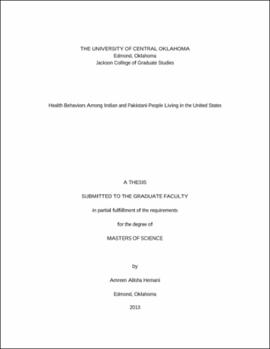| dc.contributor.advisor | Rudebock, C. Diane | |
| dc.contributor.author | Hemani, Amreen Alisha | |
| dc.date.accessioned | 2020-05-26T20:40:45Z | |
| dc.date.available | 2020-05-26T20:40:45Z | |
| dc.date.issued | 2013 | |
| dc.identifier.other | (AlmaMMSId)9979386885202196 | |
| dc.identifier.uri | https://hdl.handle.net/11244/324774 | |
| dc.description.abstract | Cardiovascular disease is the first and third leading cause of death among men and women respectively in the United States (Centers for Disease Control, 2011a). According to the National Heart Lung and Blood Institute, within the next 10 to 15 years, Asian-Indians will account for 40 to 60% of people around the world with cardiovascular disease, of which 12% will be in the U.S. Asian Indians have been identified as one group who has a higher rate of cardiovascular disease compared to other minorities. There has been little research conducted identifying reasons why Asian Indians have higher rates of cardiovascular disease. These rates have severe public health and financial implications. The purpose of this research was to determine what health behaviors may lead to this high prevalence of cardiovascular disease. The hypothesis was that lack of physical activity and length of time living in the U.S. contribute the most to a higher risk of morbidity, mortality, and cardiovascular disease among people from India and Pakistan living in the United States for at least 10 years. A survey comprised of questions about physical activity, cardiovascular health, food and vegetable consumption, and level of acculturation was given to a group of Indian and Pakistani people residing in the U.S. for at least 10 years. This study was a pilot study and had a descriptive design. The significance or alpha level for this study was set at 0.05. Pearson's correlation tests were used to assess relationships between multiple variables; no significance was found in this cohort. Independent samples t-tests were used to assess differences in variables among men and women; no significance was found in this cohort; however, a trend towards significance was found when looking for differences between men and women's acculturation scores. Very little research exits related to cardiovascular risk within this cohort; the findings from this study will help enhance the body of knowledge in this area. | |
| dc.rights | All rights reserved by the author, who has granted UCO Chambers Library the non-exclusive right to share this material in its online repositories. Contact UCO Chambers Library's Digital Initiatives Working Group at diwg@uco.edu for the permission policy on the use, reproduction or distribution of this material. | |
| dc.subject.lcsh | East Indians | |
| dc.subject.lcsh | Pakistanis | |
| dc.subject.lcsh | Cardiovascular system | |
| dc.title | Health behaviors among Indian and Pakistani people living in the United States. | |
| dc.type | Academic theses | |
| dc.contributor.committeeMember | Barnes, Karen | |
| dc.contributor.committeeMember | Farnell, Gregory | |
| dc.thesis.degree | M.S., Kinesiology and Health Studies | |
| dc.subject.keywords | Acculturation | |
| dc.subject.keywords | Cardiovascular disease | |
| dc.subject.keywords | Nutrition | |
| dc.identifier.oclc | (OCoLC)ocn858457794 | |
| uco.group | UCO - Graduate Works and Theses::UCO - Theses | |
| thesis.degree.grantor | Jackson College of Graduate Studies | |
